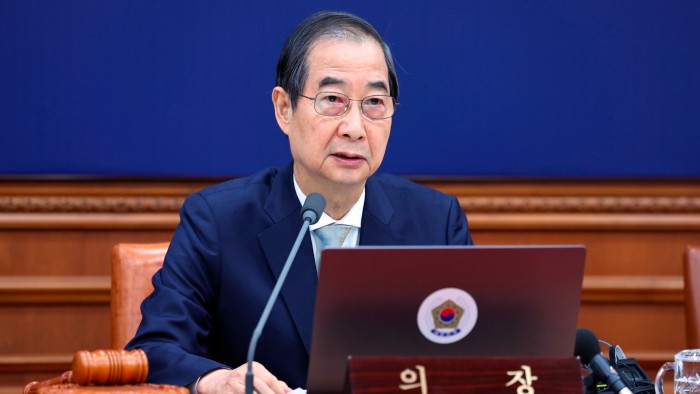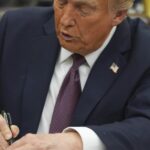Unlock the Editor’s Digest for free
Roula Khalaf, Editor of the FT, selects her favourite stories in this weekly newsletter.
South Korea’s opposition-controlled parliament has impeached the acting president, throwing the country into more political turmoil.
Lawmakers passed a motion on Friday to impeach Han Duck-soo, who is also the prime minister, after he resisted pressure to appoint three justices to fill vacancies on the constitutional court.
It marks the first time an acting president has been impeached in South Korea and comes less than two weeks after President Yoon Suk Yeol was suspended from his duties for a failed power grab.
Finance minister Choi Sang-mok is now set to assume the acting presidency.
Friday’s vote came as the country’s constitutional court opened hearings on Yoon’s impeachment over his shortlived attempt to impose martial law this month.
The court must confirm whether or not to uphold the impeachment of Yoon, who is meanwhile suspended.
The growing political turmoil is increasing risks to the economy at a time when export momentum is slowing and the country is bracing for higher tariffs once Donald Trump become US president next month, said analysts.
South Korea’s won declined 0.5 per cent against the dollar to its weakest level since 2009 on Friday, while the Kospi stock index fell 1 per cent on heavy foreign selling.
“There is some legal uncertainty over conditions needed for impeaching the acting president but, regardless of that, impeaching Han could increase concern over the economy’s external credibility,” said Shin Yul, a politics professor at Myongji University in Seoul.
Lee Jae-myung, leader of the main opposition Democratic party, accused Han of “acting for insurrection”.
Impeaching the prime minister requires a simple majority in parliament, but the ruling party claimed that the voting results were invalid, saying a two-thirds majority should be needed to impeach the acting president, as was the case when Yoon was impeached.
Han said he respected the parliament’s decision and would wait for the constitutional court’s ruling on whether to confirm his impeachment.
In principle, seven justices are needed for the court to consider an impeachment and a minimum of six votes are required to remove a president from office.
But the opposition parties are keen to accelerate the proceedings as the court currently only has six members, and the terms of two of its justices are set to expire in April.
The Democratic party has warned of a potential cascade of impeachments against cabinet members until they fill the court’s three vacancies in order to lower the bar for confirming Yoon’s removal from office.
The constitutional court has said it can deliberate without the full bench. The justices are supposed to deliver a verdict by June, although the time limit is not binding.
Yoon has vowed to “never give up” and denied any wrongdoing. He is facing a third summons by the country’s anti-corruption agency for questioning on charges of treason and abuse of power.
Prosecutors on Friday also charged former defence minister Kim Yong-hyun for spearheading Yoon’s brief attempt to impose martial law.
despite controversy over impeaching Han.
The move came as Yoon’s lawyers attended the constitutional court’s first hearing on Yoon’s impeachment.
“Han’s impeachment will deal a blow to the economy. The Democratic party led by Lee Jae-myung is just preoccupied with taking power even by ruining the country,” said Kwon Sung-dong, the PPP’s floor leader.
Before the impeachment vote on Han, Choi warned of lower economic growth next year with the country’s economic credibility hurt by the move. He also said his role as the acting president would be “limited.”
“The economy and the people’s livelihoods are walking on thin ice under a national state of emergency,” he said. “It can’t cope with any greater political uncertainty that will result from another acting president assuming the acting presidency.”







